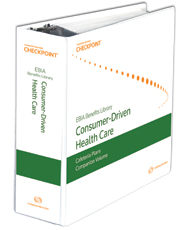Contact Your Account Manager to learn more about our Checkpoint online solutions
Written and edited by experienced employee benefits attorneys, EBIA's Consumer-Driven Health Care provides employers and advisors with in-depth coverage and analysis of legal requirements for health savings accounts (HSAs) and health reimbursement arrangements (HRAs). It features practical, real-world examples, tips, tables, checklists, and sample documents to keep you in compliance and on top of new developments. EBIA’s Consumer-Driven Health Care provides guidance on:
- HSA and HRA design, implementation, and administration, including all the basics and many complexities. HSA eligibility and contribution limits, HRA funding, employee communications (including sample documents), and reporting are all covered. You’ll learn about the expenses that qualify for reimbursement under an HRA or for a tax-free distribution from an HSA. You'll also learn when other federal laws (such as COBRA, HIPAA, and ERISA) apply and what nondiscrimination requirements must be satisfied.
- Special types of HRAs, including Individual Coverage Health Reimbursement Arrangements (ICHRAs), Excepted Benefit Health Reimbursement Arrangements (EBHRAs), and Qualified Small Employer Health Reimbursement Arrangements (QSEHRAs).
- Interaction of HSAs, HRAs, and Health FSAs. Many employers offer more than one consumer-driven health care arrangement. Learn how various vehicles interact, including ordering rules for reimbursing claims, design ideas for creating HRAs and health FSAs that don't interfere with HSA eligibility, and the types of coverage that will and will not make an individual ineligible for an HSA.

